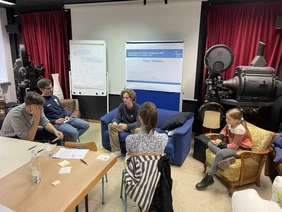What does the future hold? To answer this exciting question, the ten participants did not look into a crystal ball, but followed the four-stage process of "uncover, experiment, compare, trade". To do this, they first considered and noted down particularly probable futures in individual work. They then worked in two groups and discussed their results. The futures lab method is considered a central methodological component of UNSECO's "Futures Literacy" programme.
The first group imagined Pfaffenhofen 2040 as a city in which learning and living together go hand in hand and in which living, learning and working spaces are closely linked. According to the young people's vision, people of different origins, ages and professions will live together in communal neighbourhoods. Specific learning programmes can be launched depending on the current bottlenecks. In addition to the design of different teaching and learning landscapes in the communities, which are deliberately kept open and playful and are intended to enable intergenerational learning, businesses and companies in particular also become places of learning.
The second group presented a sophisticated daily schedule for different age and status groups such as pensioners, schoolchildren, and families. In line with this, only senior citizens are given the privilege of using parks at certain times of the day, for example. On Sundays, these usage restrictions are lifted to allow people to meet outside of private spaces. Some participants criticized the fact that the lack of opportunities to meet could lead to conflicts. However, the young people assumed that social cohesion, creativity, and cooperation in solving individual and collective problems would be strengthened.
The Futures Lab was organized by Matthias Stadler from Pfaffenhofen's youth welfare service and Michaela Härtl from the parents' council of the Schyrengymnasium. The workshop was methodically supported by Dr Stefan Bergheim from the Centre for Social Progress (ZFG).



![[Translate to English:] Logo Akkreditierungsrat: Systemakkreditiert](/fileadmin/_processed_/2/8/csm_AR-Siegel_Systemakkreditierung_bc4ea3377d.webp)








![[Translate to English:] Logo IHK Ausbildungsbetrieb 2023](/fileadmin/_processed_/6/0/csm_IHK_Ausbildungsbetrieb_digital_2023_6850f47537.webp)


